Burning Palms Blu-ray Movie
HomeBurning Palms Blu-ray Movie 
Image Entertainment | 2010 | 112 min | Rated R | May 24, 2011
Movie rating
6 | / 10 |
Blu-ray rating
| Users | 0.0 | |
| Reviewer | 1.5 | |
| Overall | 1.5 |
Overview
Burning Palms (2010)
A subversive tale that interlaces five stories set in Los Angeles, where no taboo is left unexplored as each character careens toward a dark and often comic fate.
Starring: Jamie Chung, Rosamund Pike, Dylan McDermott, Shannen Doherty, Zoe SaldañaDirector: Christopher Landon (II)
| Drama | Uncertain |
| Comedy | Uncertain |
Specifications
Video
Video codec: MPEG-4 AVC
Video resolution: 1080p
Aspect ratio: 1.78:1
Original aspect ratio: 1.78:1
Audio
English: DTS-HD Master Audio 5.1
Subtitles
English SDH, Spanish
Discs
25GB Blu-ray Disc
Single disc (1 BD)
Playback
Region A (C untested)
Review
Rating summary
| Movie | 1.5 | |
| Video | 3.5 | |
| Audio | 3.5 | |
| Extras | 0.5 | |
| Overall | 1.5 |
Burning Palms Blu-ray Movie Review
Five Tales That Will Bore You 2 Tears.
Reviewed by Casey Broadwater May 7, 2011The tagline for Burning Palms is “Five Tales That Will F#%! You Up 4 Life,” a bold claim considering that if I didn’t have to write a review about it, I would’ve promptly forgotten about this film immediately after I watched it. Like a low-rent Requiem for a Dream, Burning Palms attempts to shock its audience into disgusted awe with taboo-busting vignettes—Incest! Rape! Gay adoption!—but its characters are so vile, its tone so endlessly cynical, and its flailing attempts at humor so misguided, that the entire experience becomes a torture session akin to cinematic waterboarding. You’ll feel like you’re drowning in this movie’s suffocating awfulness. I’ve never walked out of a theater, and I’ve never turned off a film at home out of moral disgust, but while watching Burning Palms last night I was tempted to fast-forward through several scenes—not because they were offensive, but because they were obnoxious, unintelligently scripted, and ultimately pointless. Consider Burning Palms an early contender for one of the worst films of 2011.
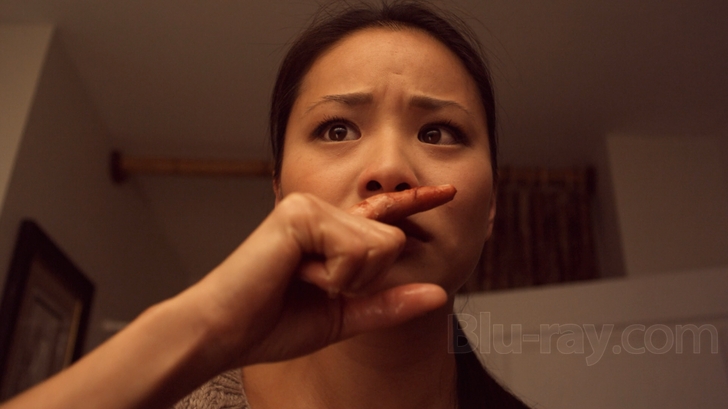
Over the course of “Five Tales of Madness,” Burning Palms purports to satirize commonly held stereotypes about the residents of different sections of Los Angeles. My first thought: Do we really need a film to tell us that some denizens of L.A. are vapid, heartless a-holes circling around a drain of inevitable depression and broken dreams? It’s unclear whether Burning Palms’ writer/director Christopher Landon—co-writer of Disturbia and Paranormal Activity 2—is being facetious or self-serious; he laces each story with pseudo-profundities but the film is too extraordinarily stupid to say anything meaningful. “Satire,” here, belongs in quotation marks.
In the first tale, “The Green-Eyed Monster”—hmm, might this be about jealousy?—snotty 15-year-old Chloe (Emily Meade), on vacation from prep school, arrives at LAX and leaps into the arms of her rich douchebag daddy, Dennis (Dylan McDermott), wrapping her legs around him. Dennis’ new fiancé, Dedra (Rosamund Pike), watches from a few steps back, eager to make a good first impression on her future stepdaughter. She doesn’t. Compared to the hypersexualized Chloe—who, when the family is out to dinner, looks the waiter up and down while ordering a “straight up and very dirty” martini—Dedra seems like a total square. We learn that Chloe’s mom slit her wrists after a bout of post-partum depression, and since then, Chloe and her dad have been incredibly close. Too close. Like, gross close. They sunbathe naked together, they share joints, and they’re very, shall we say, touchy-feely. Dedra is clearly uncomfortable with this—especially after Dennis gives her the old don’t you tell me how to raise my daughter routine—and her low self-esteem-induced wariness gradually gives way to justified paranoia. Spoiler alert: She eventually —surprise, surprise—slits her wrists in the bathtub, just like Chloe’s mom. I’m choosing to reveal this first “twist” because it’s indicative of the endings of all of the stories here. Landon seems to have confused shocking conclusions—and I’m being generous by using the term shocking—with satisfying ones.
It gets worse. For the second section, “This Little Piggy,” we go “somewhere in Westwood” to meet average college dude Chad (Robert Hoffman) and his self-conscious, straight-laced Asian girlfriend, Ginny (Jamie Chung). When Chad makes a slightly kinky sexual request—he wants her to, uh, stick a finger up his butt—Ginny complies, only to grow increasingly neurotic afterward, convinced that she can’t wash the poop smell off her finger. Yes, I’m serious. But hold on to your hats! Ginny has a full-on psychotic breakdown, and the sordid (yawn) story comes to a close when she has a vision of a CGI Jesus-on-the-cross, who tells her, “It won’t go away. Sin never does. There’s only one thing you can do. You know what must be done.” I’ll give you one guess “what must be done.” But the worst is yet to come.
Remember when Sasha Baron Cohen’s Bruno character adopted an African baby? The third section of Burning Palms, “Buyer’s Remorse,” is essentially a Johnny-come-lately version of the same, only less funny, less socially pointed, and—unlike Cohen, who’s always figuratively winking at his audience—uncomfortably close to seeming actually racist and homophobic, even though Christopher Landon himself is gay. Here, a gay couple from West Hollywood, oh-so-cutely named Tom (Peter Macdissi) and Geri (Anson Mount), buy a black market black child from a sketchy Russian and are disappointed when the 7-year-old girl—whom they christen “Mahogany”—refuses to speak, let alone play the violin like the Chinese adoptee of their gay parent friends. While philandering Geri gets his rocks off in a bondage dungeon, Mahogany gets into his stash of crystal meth—hilarious —but the big shocker comes when Mahogany’s “tribal” instincts kick in during a “get to know our new daughter” party, causing her to spear a possum with the sharp end of a tiki torch. I get it; Landon is poking fun at the concept of an adopted kid as a fashion accessory, but his hatred for his characters is off-putting, tactless, and tone-deaf.
It was at this point that I realized Burning Palms wasn’t worth my time—or yours—and although I considered blowing through the remaining segments at 10x speed, I soldiered on, sickly fascinated with how terrible the rest of film might be. While never as unremittingly bad as “Buyer’s Remorse”—Burning Palms’ eye-gougingly awful nadir—the last two sections are obnoxious and unbelievable, respectively. “Kangaroo Court” concerns a trio of spoiled-ass rich kids whose parents are away for months on end on the French Riviera, leaving the young brats in the nominal care of their pot-smoking hippy nanny (Lake Bell), who, at one point, eats cereal with a ladle out of a mild-filled bird bath. When the enshrined umbilical cord of the Hispanic maid’s long-dead infant son goes missing, the lead problem child stages a mock trial which inadvertently reveals a dark secret about the baby’s death. Bored yet? The final story, “Man Eater,” could be called the best in the bunch if you described “best” as “least likely to make you want to write hate mail to the film’s financiers.” Avatar’s Zoe Saldana plays Sarah Cotton, a rape victim who finds the left-behind wallet of her masked aggressor (Nick Stahl) and tracks him down at a dingy pizza joint in Sherman Oaks. But instead of the expected revenge scenario we’ve all come to expect, it turns out that Sarah really, really wants the guy to rape her again. How clever. Saldana and Stahl do what they can with the superficially shocking material, but I have no idea what attracted them to this project. This is one of those rare instances when I feel justified in claiming that I watched this film so that you—dear readers—wouldn’t have to.
Burning Palms Blu-ray Movie, Video Quality 
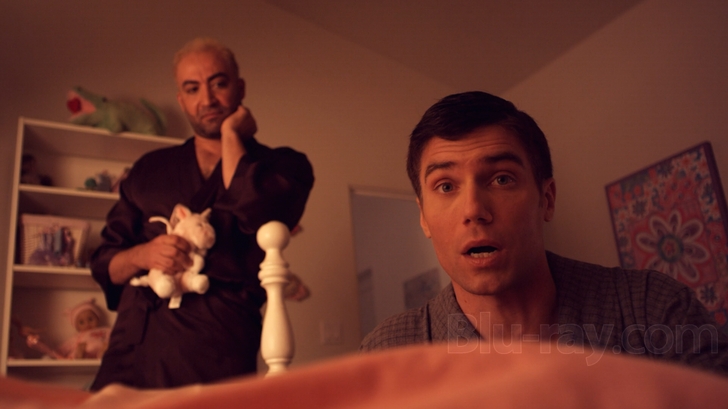
I couldn't dig up any technical specs online, but it looks to me like Burning Palms was shot digitally, and the movie transitions easily enough to Blu-ray, with a 1080p/AVC encode that, if never exactly stunning, is at least clear, moderately sharp, and free from excess compression problems. There are occasional soft shots, but most of the time the image is more than adequately crisp, displaying strong facial detail in close-ups and giving resolved definition to the characters' clothing. Color is realistic, but a little flat—although the cinematography, not the transfer, should be blamed—and while shadow areas can look a bit blotchy with noise, black levels are sufficiently deep. There are some issues with blown-out highlights whenever there are intense light sources in a shot, but that's something you expect with most mid-range digital rigs, which don't have as wide of exposure compensation as film. Given the source material, this is probably the best Burning Palms will ever look.
Burning Palms Blu-ray Movie, Audio Quality 
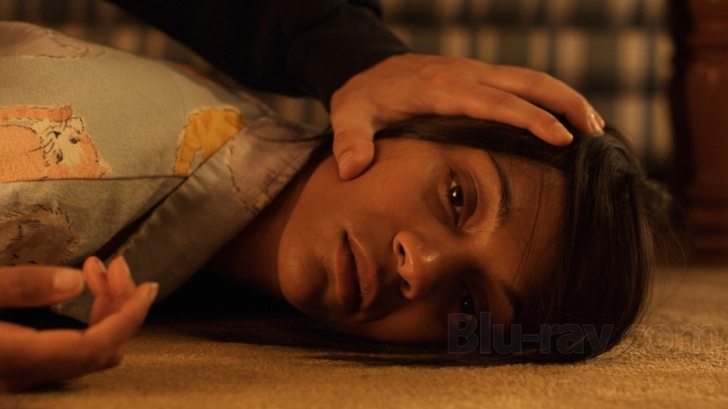
The film's DTS-HD Master Audio 5.1 surround track delivers an expectedly low-key aural experience. The film rarely gets loud—a trip to a bass- heavy nightclub is as intense as it gets—and even the mix's use of ambience stays fairly quiet. You'll hear some ocean sounds out on the pier, some LA traffic clogging up the rears, but the surround channels are most often used as bleeding room for Matthew Margeson's score and the occasional use of incidental music. It all sounds good; not necessarily punchy, but definitely clear and full. And although there were a few moments when voices seemed a bit low in the mix, dialogue is always unmuddled and intelligible. The disc includes optional English SDH and Spanish subtitles in easy-to-read white lettering.
Burning Palms Blu-ray Movie, Special Features and Extras 
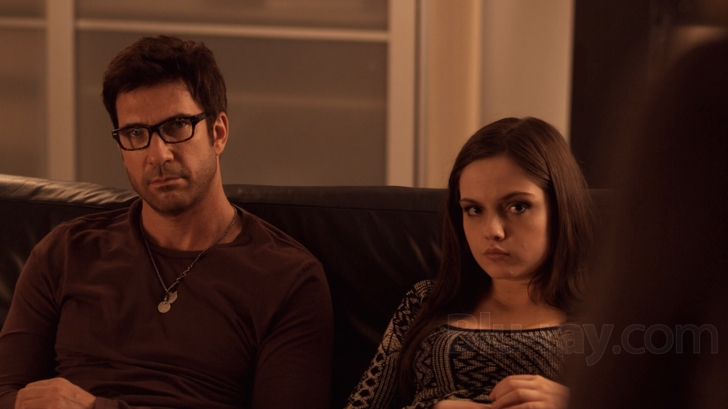
Although I was hoping for some sort of behind-the-scenes featurette—so I could at least get some entertainment out seeing the director and stars, in interviews, try to make the film sound good—but the sole supplement on the disc is a standard definition trailer.
Burning Palms Blu-ray Movie, Overall Score and Recommendation 
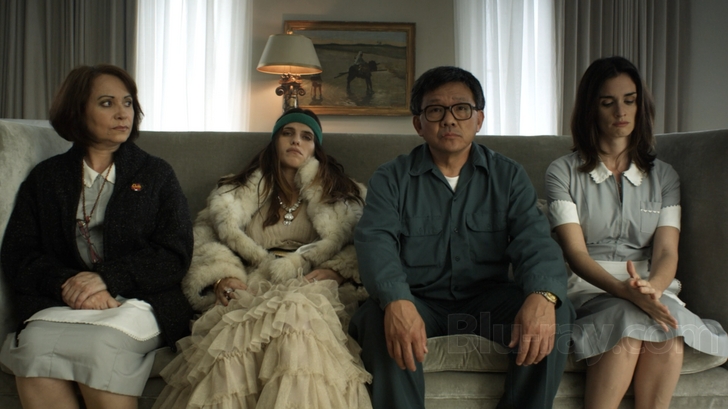
I don't understand how this film got made. Contempt for your characters and contempt for your audience isn't exactly an equation for box office success. Writer/director Christopher Landon really wants to seem shocking, but the only thing that offended me about Burning Palms was how bad it is as a film—poorly written and pointless. Unless you're some kind of cinematic masochist, avoid this one at all costs.
Similar titles
Similar titles you might also like

The Canyons
Slipcover in Original Pressing
2013

Trust
2010

American Pastoral
2016

Chained for Life
2018

Gloria Bell
2018

Leave No Trace
2018

Where'd You Go, Bernadette
2019

The Wizard of Lies
2017

North Country
2005

Joe Somebody
2001

Where's Poppa?
1970

Bigger Than Life
1956

Alice, Darling
2022

Please Stand By
2017

Togetherness: The Complete First Season
2015

Adore
Perfect Mothers
2013

Take This Waltz
2011

Ingrid Goes West
2017

Ted K
2021

The Bigamist
1953